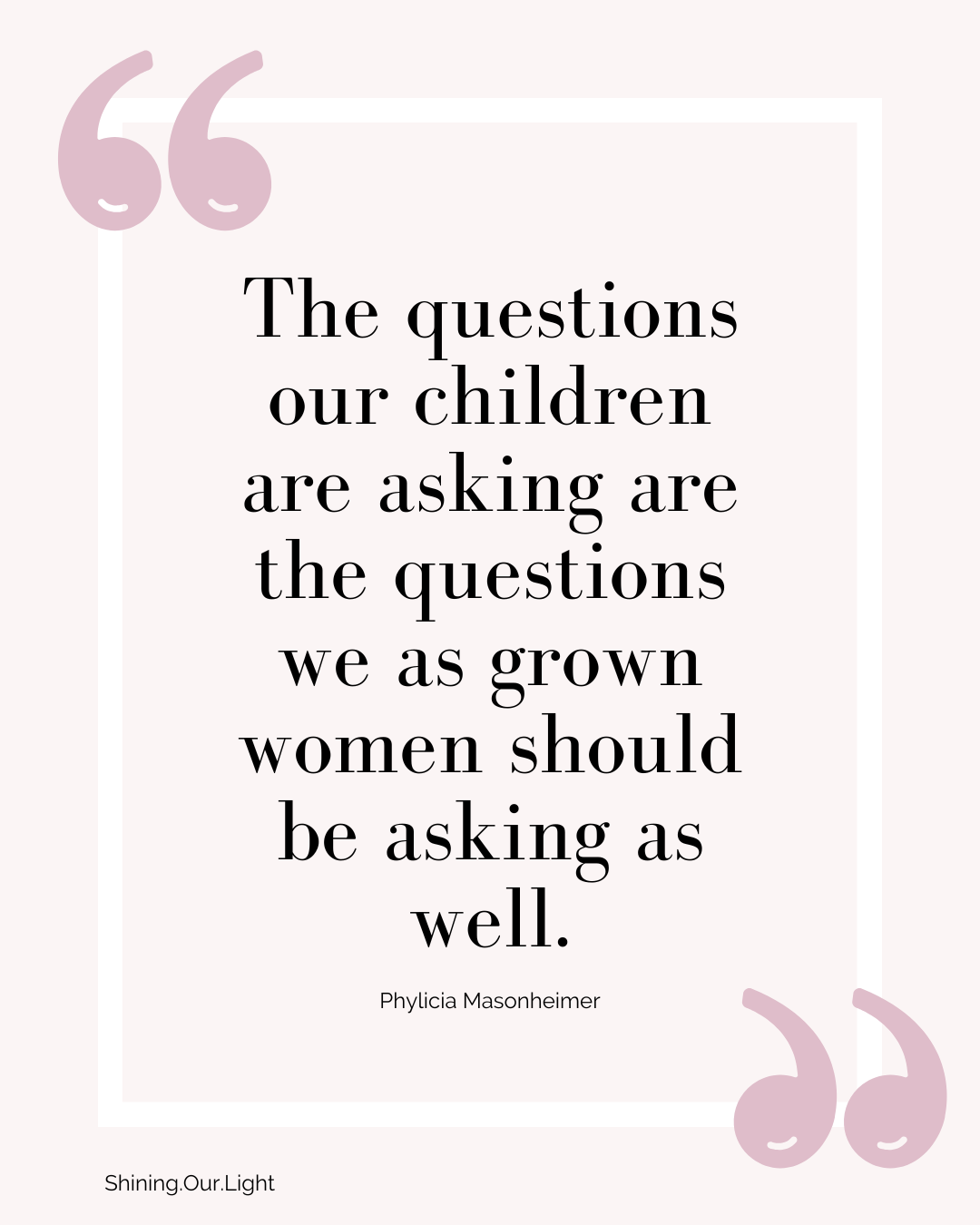When my son was younger, he was witty. We were always laughing at the funny things he would do and say. He is the youngest of three boys who tried his best to be like his older brothers. He is growing up to be very much his own person, but with several admirable traits, following in their footsteps. Regularly, one of us will scroll through my FB memories to recall those funnier days of life and we laugh all over again.
My kiddo is still witty today, but instead of recording the funny things that come out of his mouth, I usually just roll my eyes and giggle on the inside. A mom has to keep her poker face solid - especially with a teenager. I always say toddlers and teenagers are basically the same, and if you stop to think about all the ways that statement is true, a lightbulb will turn on. I wish I had time to talk about the striking similarities, but for now, I will highlight just one that will help us dig into week three of Every Woman a Theologian.
All.The.Questions
With toddlers, it tends to be innocent, though admittedly annoying. Why do I have to pick up my toys? When will daddy be home? Why can’t I have another glass of water? Can you tuck me in one more time? And teenagers don’t always ask more advanced questions, either. They just do it with a little more sass. Why is that my curfew? Why do I have to do chores? Why can’t I eat Taco Bell for the 3rd time this week? Is that broccoli?
Thankfully, not all questions make us want to run away.
Questions are good and we should certainly encourage our kids to ask them - especially when it comes to their faith. That means we need to be equipped to answer those questions - with more than an exasperated, “Because I said so…”
I believe the church of the West has gotten a few things wrong over the years and our young adults are suffering the consequences. We brought them up in a church experience centered around the wrong three-letter word. We tricked our parents into thinking a dynamic children’s ministry would be the best hour of the week. When they graduated high school and went out into the real world, they didn’t know how to sift what they encountered through the eyes of faith. They didn’t know what they believed, and they fumbled in the weak faith they developed amidst candy bribes and pool tables. We failed to encourage spiritual growth and discipleship. Our current generation is about to have the same experience unless we begin to intervene with some serious teaching. But how can we teach them if we don’t know ourselves? We have to answer our own questions before we can answer theirs.
That is what chapter three is all about.
Learning.
Growing.
Sharing.
Week three continues the pattern of learning terminology, beginning with terms like cosmology, anthropology, and hamartiology. You get bonus points if you can pronounce those words correctly. The hard-to-pronounce words aren’t the only things filling the pages of chapter three. No, the chapter is also filled with questions - some of which Phylicia helps us answer and some in which she encourages us to use our own brains (hence the book…) - and I think that is my favorite part. Using our own brains seems to be a lost art. Let’s bring that back like bell-bottom jeans.
As Phylicia writes herself,
“It’s right to ask the hard questions of Scripture. It’s good to employ our minds in pursuit of truth, even when the questions are uncomfortable and risky.”
Our study of God must include hard questions. Questions we are willing to leave unanswered as we wrestle. Sometimes that wrestling is playful in the living room and answers come quickly. Other times that wrestling happens over and over as we reach for our bibles and commit to studying until we are satisfied with an answer. Our answer - not a copied answer from our favorite preacher or bible teacher.
It is good for us to have knowledge about things like cosmology and theism to lead us into the deeper questions of our faith. Questions like:
“From the standpoint of cosmology, why is idolatry so offensive to God?”
“Where does our value as humans come from, and is it possible to destroy that value?”
“Our Adamic ancestors made a choice to align with hopelessness. What practical avenues do we have to align with hope? Have you ever experienced disillusionment when you thought you were doing something creative and hopeful? What did you do about that disillusionment?”
Friends, I won’t sugarcoat this for you. We have to study the bible. Really study it. We have to know what is in the bible - all of it, not just the “popular” stories. We also have to know what those stories mean and how they relate to the bigger story. When we study the bible for ourselves, we learn more and more about the God of the bible. The God who is rich in love. The God who created us in his image. The God who ordained our lives. The God who gave us passion and purpose. Oh yes, and the God who gave us questions.
We can’t answer those questions if we don’t know the answers ourselves. No, we don’t have to know all the answers (imagine God saying, “because I said so…” every now and then), but we do need to know what we believe and why we believe it. That is the starting point for our conversations. When we know the answers to the what and the why, we are better able to share the who. Chapter three will help.
I am praying for you as you continue your study.
D 😊





